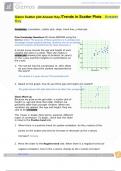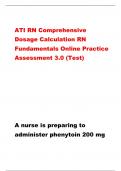Exam (elaborations)
Gizmo Scatter plot Answer Key./Trends in Scatter Plots Answer Key
- Course
- Institution
Gizmo Scatter plot Answer Key./Trends in Scatter Plots Answer Key Vocabulary: correlation, scatter plot, slope, trend line, y-intercept Prior Knowledge Questions (Do these BEFORE using the Gizmo.) [Note: The purpose of these questions is to activate prior knowledge and get students thinki...
[Show more]












